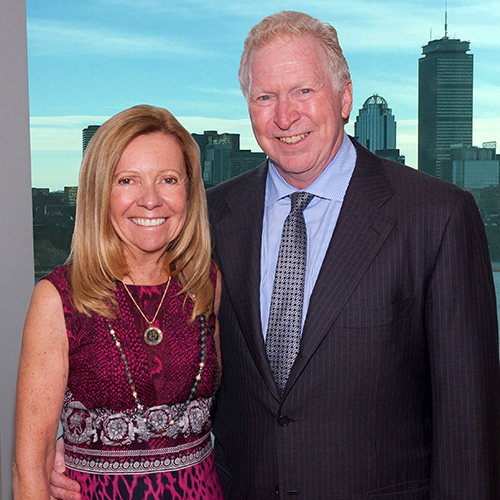
Terry and Susan Ragon
Susan and I often find ourselves wondering, ‘Why were we born with so many advantages in life when others are born with none?’ It is, of course, an accident of birth. Susan and I were born in families of modest means, but we always had enough, we had natural gifts, and we had opportunities. As those advantages have turned into financial success, we’ve increasingly felt a responsibility to help those less fortunate."
Pledge letter
December 24, 2016
Susan and I often find ourselves wondering, “Why were we born with so many advantages in life when others are born with none?” It is, of course, an accident of birth. Susan and I were born in families of modest means, but we always had enough, we had natural gifts, and we had opportunities. As those advantages have turned into financial success, we’ve increasingly felt a responsibility to help those less fortunate.
While we work together in philanthropy, Susan and I approach helping in very different ways – although in both cases the help is heart felt. Susan prefers touching the lives of those she has met, which may be as simple as remembering their birthday, taking the time to say hello or comforting them in time of pain, or helping them financially in a time of need. These are often people she’s met – perhaps briefly – that are underappreciated, looked down upon, or perhaps not seen at all. She finds a personal connection in helping people one at a time.
My passion has been helping people in need in developing countries develop the ability to help themselves. These are people who need help through no fault of their own. I spent my senior year of high school in South America – in Bogota, Colombia – where I saw intense poverty. Every day I rode the bus to school with my nose pressed against the glass, staring at the kids out on the street, who would stop and stare back at me. Many of them didn’t have a stitch of clothes and merely a stick for a toy. Thus one of our philanthropic efforts has been to build schools for poor communities in Bogota and help people who fled into Bogota to escape the surrounding bloodshed brought on by war and drug cartels. It has never felt like enough. I’ve always wanted to do more, to have a bigger impact.
About ten years ago I found myself in South Africa where a physician agreed to let me sit with her as she examined three patients at an HIV clinic. All three were dying – the third one in front of me with congestive heart failure. She was discharged to the street.
It was obvious that HIV had so totally overwhelmed the lives of these people that it was difficult to accomplish anything there without first eliminating this disease and its close cousin – tuberculosis. I initially thought there was so much money in research that any money I provided would be a waste, but then I began to understand how science is funded and conducted. It became obvious to me that there is a better way to approach this and similar problems, and that there is an enormously powerful role that philanthropy can play.
To change the world, you need to find the right fulcrum and the right place to put it. In our case, we decided the fulcrum was research and the right place for us to put it was in Cambridge, MA, where there is an enormous density of extremely talented and dedicated people. We created a joint research institute of Massachusetts General Hospital, MIT, and Harvard – the Ragon Institute. Its vision is to harness the immune system to prevent and cure disease, and our first objective is to create a vaccine (and hopefully a cure as well) for HIV – an objective on which we have made enormous progress.
There are, of course, many ways of having an impact – these are just some in which we have been attempting to do so.
We have been privileged to create considerable wealth, and we face decisions about how best to use it. Naturally, we wish to help our children and make sure they have what they need – and fortunately we are able to easily do so – but providing much more than that will not increase their happiness.
Ultimately, our real goal is to leave the world at least a little better than we found it – or at least better than it would otherwise have been. Thus, after providing for our children, we wish the rest of our wealth, which is clearly the majority, to be spent trying to touch the lives of others and make the world a better place, and we do so pledge.
Phillip T. (Terry) and Susan M. Ragon
